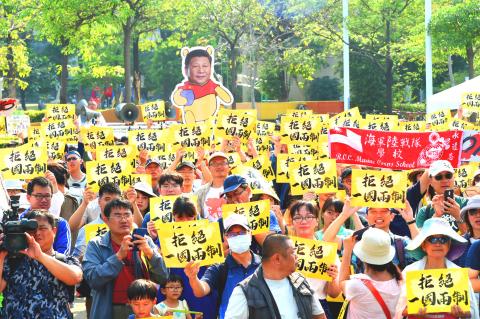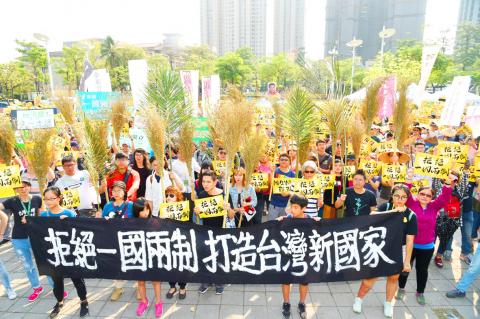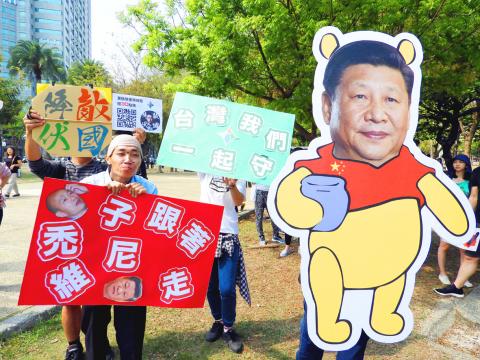A group of about 1,000 people yesterday protested in Kaohsiung’s Labor Park against China’s proposal to implement a “one country, two systems” framework in Taiwan.
The march, organized by Citizen Front Taiwan, also protested Kaohsiung Mayor Han Kuo-yu’s (韓國瑜) visits last month to China’s liaison offices in Hong Kong and Macau.
Critics said the visits were inappropriate and suggested that Han accepts China’s “one country, two systems” model.

Photo: Chang Chung-yi, Taipei Times
The protesters shouted “Today Hong Kong, tomorrow Taiwan” and “Reject ‘one country, two systems,’ resist Chinese annexation” and other slogans.
By visiting the offices and signing a memorandum of understanding on fruit exports with Chinese officials, Han is “returning to the old ways of [former president Ma Ying-jeou’s (馬英九)] administration,” Sunflower movement leader Lin Fei-fan (林飛帆) told the crowd, accusing Han of “locking Taiwan into a ‘one China’ framework” in the name of boosting the economy.
Ma “placed all of Taiwan’s resources into China” during his presidency, like putting all of one’s eggs in one basket, Lin said.

Photo: Chang Chung-yi, Taipei Times
As a result, Taiwan’s economy became reliant on China, he said.
“Are we going to go back to the old ways?” he asked.
Han did not give prior notice of his visits to the offices, said Citizen of the Earth, Taiwan chairman Lee Ken-cheng (李根政), who also serves as an organizer of Citizen Front Taiwan.

Photo: Ko Yu-hao, Taipei Times
By entering the offices, Han “cooperated with Chinese President Xi Jinping’s (習近平) ‘united front’ strategy,” Lee said.
Biased information from China makes it impossible for people to access correct information, Citizen Front Taiwan organizer Shen Pai-yang (沈柏洋) said.
National security officials need to act on the “information war” the nation is facing. Many countries are slowly being infiltrated by China, but the most serious case is Taiwan, which is the least able to resist infiltration, he added.
Edith Cheung (鍾慧沁), who in September last year immigrated from Hong Kong, said Hong Kongers only became poorer after the “one country, two systems” model was implemented there.
Real-estate prices went up due to Chinese buyers, and young Hong Kongers, faced with competition from China, could not find jobs, she said.
Charng Mei (常美冰店), an ice cream store in Cishan District (旗山), showed its support by sending 300 popsicles to the protesters.
The Kaohsiung City Police Department dispatched 100 police officers to the park to prevent any clashes between the protesters and members of the public.

TRAGEDY STRIKES TAIPEI: The suspect died after falling off a building after he threw smoke grenades into Taipei Main Station and went on a killing spree in Zhongshan A 27-year-old suspect allegedly threw smoke grenades in Taipei Main Station and then proceeded to Zhongshan MRT Station in a random killing spree that resulted in the death of the suspect and two other civilians, and seven injured, including one in critical condition, as of press time last night. The suspect, identified as a man surnamed Chang Wen (張文), allegedly began the attack at Taipei Main Station, the Taipei Fire Department said, adding that it received a report at 5:24pm that smoke grenades had been thrown in the station. One man in his 50s was rushed to hospital after a cardiac arrest

A car bomb killed a senior Russian general in southern Moscow yesterday morning, the latest high-profile army figure to be blown up in a blast that came just hours after Russian and Ukrainian delegates held separate talks in Miami on a plan to end the war. Kyiv has not commented on the incident, but Russian investigators said they were probing whether the blast was “linked” to “Ukrainian special forces.” The attack was similar to other assassinations of generals and pro-war figures that have either been claimed, or are widely believed to have been orchestrated, by Ukraine. Russian Lieutenant General Fanil Sarvarov, 56, head

SAFETY FIRST: Double the number of police were deployed at the Taipei Marathon, while other cities released plans to bolster public event safety Authorities across Taiwan have stepped up security measures ahead of Christmas and New Year events, following a knife and smoke bomb attack in Taipei on Friday that left four people dead and 11 injured. In a bid to prevent potential copycat incidents, police deployments have been expanded for large gatherings, transport hubs, and other crowded public spaces, according to official statements from police and city authorities. Taipei Mayor Chiang Wan-an (蔣萬安) said the city has “comprehensively raised security readiness” in crowded areas, increased police deployments with armed officers, and intensified patrols during weekends and nighttime hours. For large-scale events, security checkpoints and explosives

PUBLIC SAFETY: The premier said that security would be tightened in transport hubs, while President Lai commended the public for their bravery The government is to deploy more police, including rapid response units, in crowded public areas to ensure a swift response to any threats, President William Lai (賴清德) said yesterday after a knife attack killed three people and injured 11 in Taipei the previous day. Lai made the remarks following a briefing by the National Police Agency on the progress of the investigation, saying that the attack underscored the importance of cooperation in public security between the central and local governments. The attack unfolded in the early evening on Friday around Taipei Main Station’s M7 exit and later near the Taipei MRT’s Zhongshan